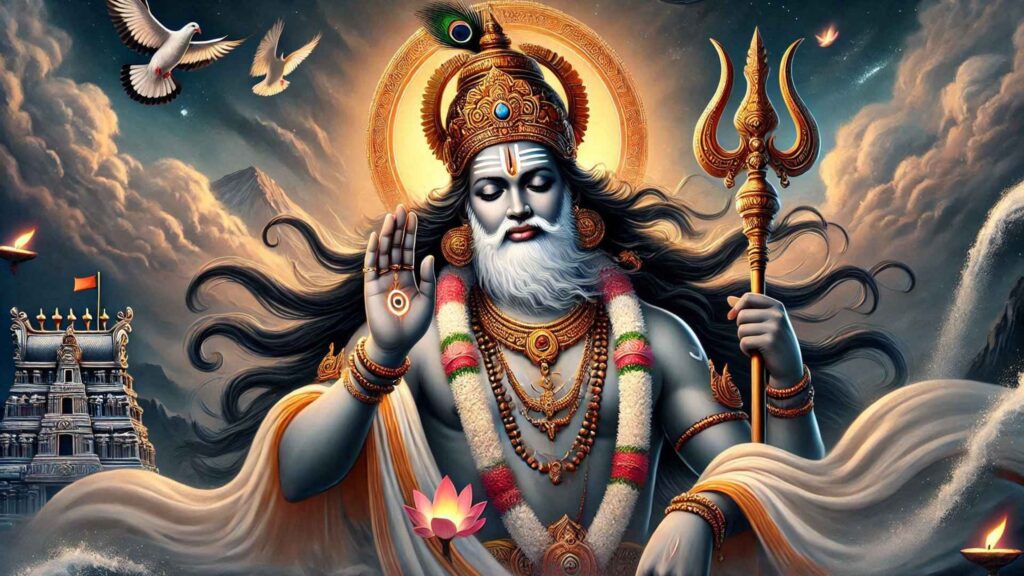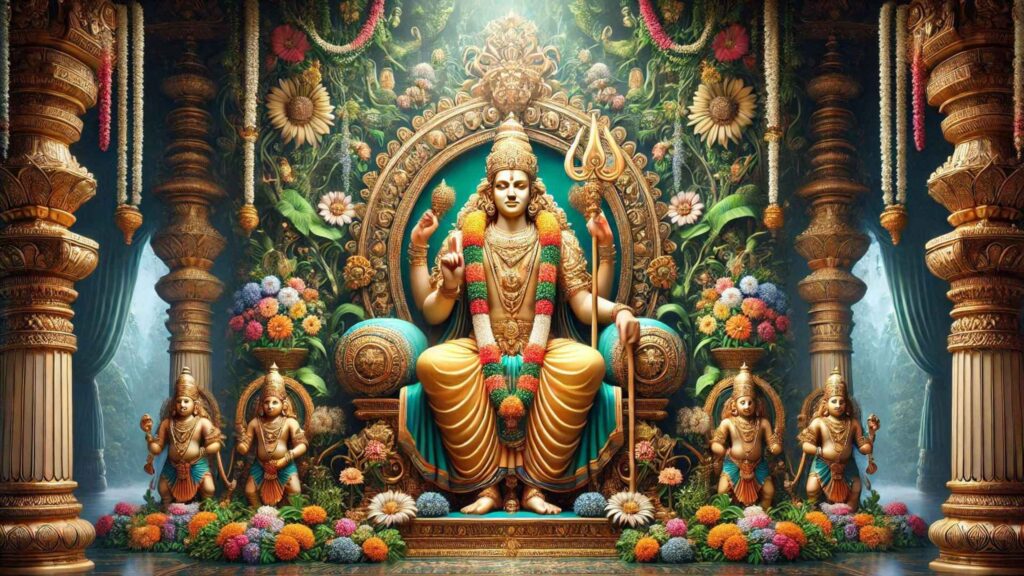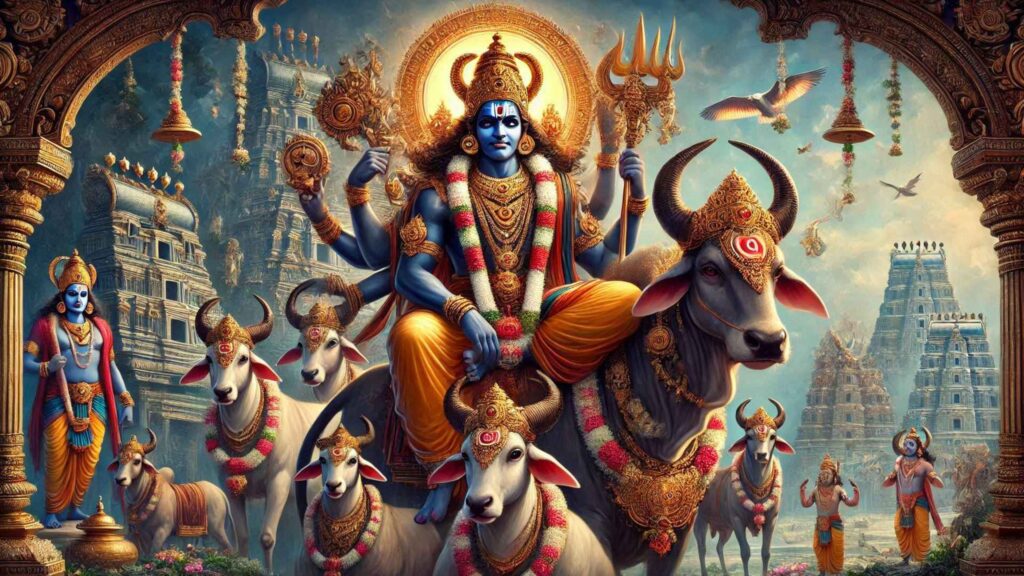Introduction
Lord Ayyappa, revered as the deity of Dharma (righteousness), celibacy, and truth, is a significant figure in Hinduism, especially in South India. Known as the son of Lord Shiva and Mohini (the female form of Lord Vishnu), Ayyappa represents the confluence of masculine strength and feminine compassion.
Read More About Deities And Gods
Ayyappa is worshipped for his role as the protector of devotees and the destroyer of evil. His temple at Sabarimala, nestled in the Western Ghats of Kerala, is one of the most popular pilgrimage destinations in the world, drawing millions annually. The journey to Sabarimala is a testament to devotion, discipline, and the pursuit of inner purity.
Names and Etymology

Meaning of the Name Ayyappa
The name Ayyappa is derived from Tamil-Malayalam roots, where Ayyan means ‘respected elder’ or ‘Lord,’ and Appa means ‘father.’ Combined, Ayyappa signifies a revered and protective fatherly figure.
Other Names of Ayyappa
- Hariharasutan – Son of Hari (Vishnu) and Hara (Shiva).
- Manikandan – Refers to the divine gem (mani) tied around his neck (kanda).
- Dharma Shasta – The upholder of Dharma and protector of truth.
- Sabarigiri Vasan – The resident of Sabari Hills.
Each name emphasizes his multifaceted roles as a protector, spiritual guide, and embodiment of divine unity.
Symbolism and Iconography

Physical Description
Ayyappa is typically depicted as a handsome, youthful god seated in a yogic posture (Padmasana), with his hands resting on his knees. He wears a crown and a sacred necklace with a bell, symbolizing his divine origins and connection to devotees.
Symbolism
- Yogic Posture: Reflects his mastery over mind and body, symbolizing inner peace.
- Bell Necklace: Represents alertness and protection from evil forces.
- Crown: Denotes his divine authority.
Flower and Colors Associated
- Flowers: Tulsi, lotus, and jasmine are commonly offered.
- Colors: Black and saffron symbolize renunciation and devotion.
Mythology and Stories

Birth Story
Ayyappa’s birth is rooted in the cosmic battle between good and evil. When the demoness Mahishi, cursed to die only at the hands of the child born of Shiva and Vishnu, wreaked havoc, Lord Vishnu took the form of Mohini and united with Shiva. This union birthed Ayyappa, who was destined to end Mahishi’s tyranny.
As a child, Ayyappa was found and adopted by the Pandalam royal family. Despite his royal upbringing, he embraced his divine mission and defeated Mahishi, fulfilling his purpose.
Connection with Other Deities
- Shiva and Vishnu: Ayyappa symbolizes the fusion of their energies.
- Durga: Ayyappa is sometimes associated with Durga’s protective and nurturing qualities.
Role in Ramayana and Mahabharata
Ayyappa’s specific form does not feature in these epics but embodies the principles of Dharma and devotion emphasized throughout Hindu scriptures.
Famous Blessings and Boons
- Ayyappa is believed to bless his devotees with discipline, peace, and spiritual awakening.
- He protects devotees from evil forces and ensures their adherence to Dharma.
Spiritual Significance
A Visible Form of God
Ayyappa’s manifestation reminds devotees of the power of Dharma and the unity of divine forces.
Representation of Knowledge and Enlightenment
Ayyappa’s yogic posture and celibacy symbolize the pursuit of self-realization and spiritual discipline.
Connection to Spiritual Awakening
The rigorous Sabarimala pilgrimage reflects Ayyappa’s teaching of transcending worldly desires for higher consciousness.
Role in Yoga and Meditation Practices
Meditating on Ayyappa aligns inner energies and fosters focus, self-control, and spiritual growth.
The Mantra Connection
Chanting Ayyappa’s mantra invokes his blessings:
“Swamiye Saranam Ayyappa”
Worship and Rituals
Benefits
- Spiritual discipline and self-purification.
- Removal of obstacles and protection from negative forces.
- Strengthened willpower and devotion.
Daily Worship Practices
Devotees light lamps, offer tulsi and jasmine, and chant his mantra daily to seek Ayyappa’s blessings.
Best Times for Worship
- Mandala Kalam: A 41-day period of austerity leading up to the Sabarimala pilgrimage.
- Significant Days: Makaravilakku (mid-January) marks the climax of the pilgrimage season.
Important Festivals
- Makaravilakku: Celebrates Ayyappa’s divine light on the Sabari Hills.
- Vishu: In Kerala, Ayyappa is revered during this harvest festival.
List of Famous Temples
- Sabarimala Temple, Kerala: The most significant shrine of Ayyappa, attracting millions annually.
- Achankovil Temple, Kerala: Associated with Ayyappa’s healing powers.
- Aryankavu Temple, Kerala: One of the five temples dedicated to Ayyappa.
Modern Relevance
Scientific Understanding
The disciplined practices associated with Ayyappa’s worship, including fasting and celibacy, promote mental clarity and physical health.
Environmental Consciousness
Ayyappa’s temples, particularly Sabarimala, emphasize harmony with nature, advocating sustainable practices and preserving the pristine environment.
Health Benefits
The pilgrimage’s emphasis on walking barefoot and consuming a simple diet fosters physical fitness and mental resilience.
Energy Connection
Ayyappa’s teachings encourage devotees to balance their inner energies, promoting holistic well-being.
Sustainable Living Practices
The austerities of Ayyappa worship highlight the value of simplicity and mindful consumption.
Cultural Impact
Influence on Indian Art and Architecture
Ayyappa’s imagery has inspired traditional temple designs, sculptures, and paintings across South India.
Presence in Literature and Poetry
Devotional hymns, such as the Ayyappa Bhajans, praise his virtues and recount his mythology.
Impact on Daily Customs
Ayyappa’s principles encourage discipline, humility, and devotion in everyday life.
Regional Variations in Worship
- South India: Ayyappa is widely revered, with unique traditions like the 41-day Mandala Kalam.
- North India: His worship is growing, blending with regional practices.
Practical Applications
Morning Prayers and Rituals
Starting the day with Ayyappa’s mantra instills focus and discipline.
Benefits of Salutation
Prostrating before Ayyappa invokes his blessings for protection and spiritual growth.
Dietary Recommendations
Fasting and consuming vegetarian food align with the spiritual austerities of Ayyappa worship.
Astrological Significance
Ayyappa is associated with Saturn (Shani), representing discipline and karmic balance.
Gemstones and Metals Associated
- Gemstone: Blue sapphire, symbolizing discipline and protection.
- Metal: Iron, used in sacred objects associated with Ayyappa.
Conclusion
Lord Ayyappa’s teachings embody the essence of discipline, devotion, and Dharma. His form as the unifier of Shiva and Vishnu’s energies symbolizes divine balance, guiding devotees toward self-purification and spiritual realization. The Sabarimala pilgrimage and associated rituals reflect his message of transcending worldly desires for inner peace and enlightenment.
Worshiping Ayyappa instills qualities of perseverance, humility, and righteousness, making his teachings timeless and universally relevant.


